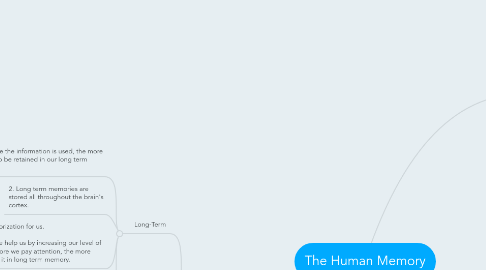
1. Types of Memory
1.1. Long-Term
1.1.1. 1. The more the information is used, the more likely it is to be retained in our long term memory.
1.1.2. 2. Long term memories are stored all throughout the brain's cortex.
1.1.3. 3. Color has an effect on memorization for us. Warmer colors such as red, yellow, and orange help us by increasing our level of attention and obviously, the more we pay attention, the more likely it is for our brain to store it in long term memory.
1.1.4. 4. Sleep is vital to long-term memory, and day time naps especially help with memorization and remembering important ideas.
1.2. Short-Term (working)
1.2.1. 5. In 2010, a study was done that successfully linked poor short- term memory to depression. People with a good working memory are overall more optimistic and happy.
1.2.2. 6. Psychologists have determined that 7 information bits (give or take 2) is the max that the human brain can retain in our short term memory. Psychologists have called this theory the "Magical Number Sevens" and also came up with this list of examples: 7 wonders of the world, the 7 seas, the 7 deadly sins, the 7 primary colors, the 7 musical scale notes and the seven days of the week.
1.3. Sensory
1.3.1. 7. Our sensory memory is split into 5 different sections, one for every sense.
2. Functions of Memory
2.1. Organization
2.1.1. 12. "Memory is not like a container that gradually fills up; it is more like a tree growing hooks onto which memories are hung." - Peter Russell
2.2. Encoding
2.2.1. 13. Studies have shown that attention significantly effects memory during the encoding stage, but hardly at all for the retrieval.
2.2.2. 14. It is easier for us to recall information when the environment is the same to a past event that we can remember. A certain environment is part of the encoding process
2.3. Retrieval
2.3.1. 15. Memory recall is "state-dependent" which means if we were to learn something under the influence of drugs or alcohol, the memory would be easiest to retrieve when we were under the influence of the same intoxicant rather than if we are sober.
